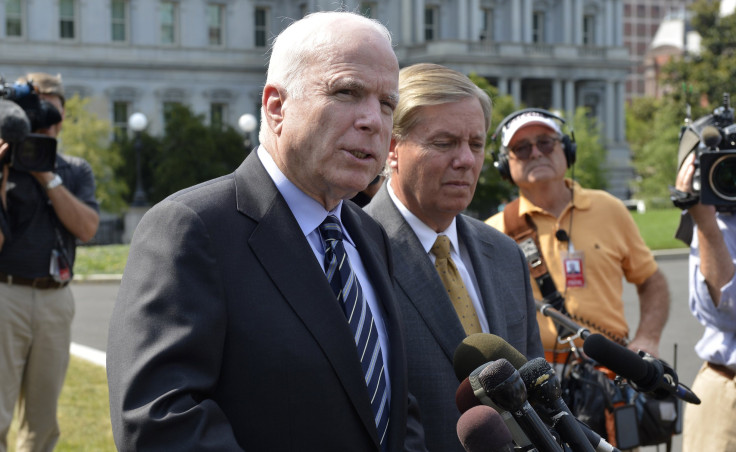Syria News: Republicans In Congress Face Difficult Choice On Syria

Many believe that if it weren’t for President George W. Bush's invasion of Iraq in 2003, Barack Obama would not be president today. More specifically, if it weren’t for his opposition to the Iraq War, then-Sen. Hillary Clinton would likely have nabbed the Democratic nomination in 2008. But Clinton voted for Iraq while Obama, a little-known state senator at the time, opposed it. By 2008, war-weary liberals gave their vote to Obama.
Today, Republicans could be facing a similar conundrum on whether to support a military strike on Syria. As the interventionist and isolationist factions in the GOP struggle for control of the party, how lawmakers vote in the coming weeks on Syria could have repercussions in the 2014 midterm elections. Further, depending on what ultimately happens in Syria, it could even help determine who gets the GOP’s presidential nomination in 2016.
During the George W. Bush era, before the tea party movement made significant inroads into the Congressional ranks, Republicans were the interventionist party. But today, after tea party candidates have been elected in two consecutive cycles, the party is split over whether to launch a military strike against Syria. In fact, it looks like a majority of Republicans in the House of Representatives will vote against it.
“It’s much safer to vote no than vote yes,” said Republican strategist Ron Bonjean. He said elected officials who vote no on a strike will be less vulnerable to a primary challenge from the right, while those who vote yes “will have some explaining to do.”
In fact, several primary challengers are already using the Syria question to attack incumbent Republicans. In Kentucky, tea party candidate Matt Bevin is going after Senate Minority Leader Mitch McConnell, who has not yet decided how he will vote on a Syria resolution, by charging that he is not leading on the issue. Bevin has said he “adamantly” opposes military involvement.
The Syria vote is likely to play a role in next year’s Senate contest in Arkansas, a red leaning state where vulnerable incumbent Mark Pryor is trying to keep his seat. Over the weekend, Pryor came out against an attack on Syria. Meanwhile, the Republican candidate, freshman Rep. Tom Cotton, a veteran who served in Iraq and Afghanistan, is trying to rally support behind a strike.
While Bonjean chalks up Republicans’ opposition partially to polls showing Americans opposed to intervention, he says it is definitely a result of the influence of the tea party as well. That most House Republicans returned from the August recess intending to vote against the resolution is a significant shift.
When it comes to the presidential contest in 2016, it’s already clear that Republicans will have to choose between a pro-interventionist, such as New Jersey Gov. Chris Christie or New York Rep. Peter King, or an isolationist, such as Kentucky Sen. Rand Paul. If the United States ends up not striking Syria or launching a limited attack only, it’s unlikely that the Syria vote will become a big issue during the GOP's presidential primaries, Bonjean predicted. But if a strike ends up leading to a more serious commitment in the region or even boots on the ground, then a vote for the Syria resolution could take down a candidate the same way Iraq ultimately hurt Clinton.
Since it is unclear at this point whether the interventionist or isolationist factions has more sway in the party, the safest bet for Republicans, particularly in the House, is to vote against intervention, since that’s where public opinion lies. If a member of Congress called Bonjean for his political advice, he said, “I would tell them to vote no.”
© Copyright IBTimes 2024. All rights reserved.












